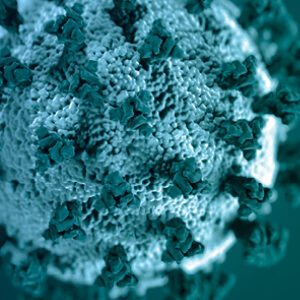
Variants of Concern in Spokane County and Beyond—Key Information for Clinicians
SARS-CoV-2, like other coronaviruses, mutates and produces variant strains as it spreads to susceptible hosts. The longer we go with suboptimal vaccination coverage and insufficient herd immunity in Washington state, the United States, and the rest of the world, the more opportunity for variants of concern to spread, and potentially, for different variants of concern to emerge. In Spokane County in 2020, sequencing of 117 SARS-CoV-2 specimens identified two cases with variants of concern: one B.1.1.7 (Alpha) and one P.1 (Gamma). In 2021, specimens from 498 COVID-19 cases were submitted for sequencing. Sequencing was completed for 586 cases. The chart and table below show the variants identified in Spokane County COVID-19 cases with PCR result dates from Jan 1, 2021 to June 26, 2021 as of July 13, 2021.*
*These data were updated on July 15, 2021, to reflect data received through July 13, 2021.
| Variant | Number | % of 2021 sequenced cases |
| Not of interest or concern | 248 | 42% |
| Variants of Concern | ||
| B.1.1.7 (Alpha) | 145 | 25% |
| B.1.351 (Beta) | 1 | <1% |
| P.1 (Gamma) | 98 | 17% |
| B.1.617.2 (Delta) | 8 | 1% |
| Variants of Interest | ||
| B.1.526 (Iota) | 31 | 5% |
| B.1.525 (Eta) | 3 | 1% |
| B.1.617.1 (Kappa) | 1 | <1% |
| B.1.429 (Epsilon) | 46 |
8% |
| B.1.427 (Epsilon) | 4 | 1% |

Important Points About Variants of Concern
- The Centers for Disease Control and Prevention (CDC) and the Washington State Department of Health (DOH) are adopting the World Health Organization (WHO) labeling format for variants, which uses letters of the Greek alphabet to rename variants of concern or interest (reflected in the table above).
- Variants are identified by performing whole genome sequencing (WGS) on specimens testing positive for SARS-CoV-2 by Nucleic Acid Amplification Test (NAAT). For more information on submitting specimens to a laboratory for WGS, please see the health advisory “SARS-CoV-2 Sequencing Information for Clinicians and Healthcare Facilities.”
- Clinicians should communicate to their patients that some of the variants are associated with a greater chance of severe illness (including hospitalization), which makes getting vaccinated even more important for their personal health and those around them.
- DOH publishes a weekly update on variants of concern circulating in Washington state, which is available on the Washington state COVID-19 Data Dashboard page in the Reports section.
